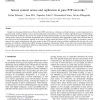18 search results - page 3 / 4 » Introducing Decryption Authority into PKI |
CCS
2005
ACM
13 years 11 months ago
2005
ACM
We introduce a new cryptographic primitive, called insubvertible encryption, that produces ciphertexts which can be randomized without the need of any key material. Unlike plain u...
COMCOM
2008
13 years 5 months ago
2008
Despite the advantages offered by pure Peer-to-Peer (P2P) networks (e.g. robustness and fault tolerance), a crucial requirement is to guarantee basic security properties, such as ...
CRYPTO
2007
Springer
13 years 12 months ago
2007
Springer
One day, you suddenly find that a private key corresponding to your Identity is up for sale at e-Bay. Since you do not suspect a key compromise, perhaps it must be the PKG who is...
CANS
2010
Springer
13 years 3 months ago
2010
Springer
Abstract. Predicate encryption is a new powerful cryptographic primitive which allows for fine-grained access control for encrypted data: the owner of the secret key can release pa...
CCS
2009
ACM
14 years 6 months ago
2009
ACM
In a proxy re-encryption (PRE) scheme [4], a proxy, authorized by Alice, transforms messages encrypted under Alice's public key into encryptions under Bob's public key w...


